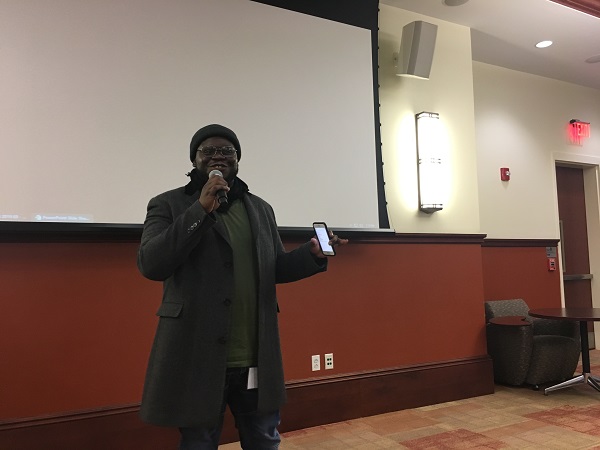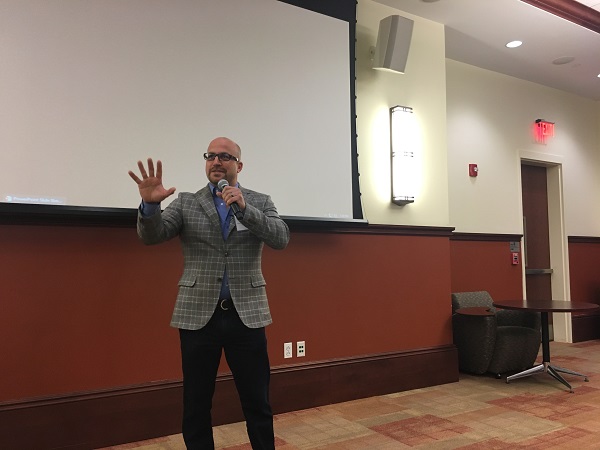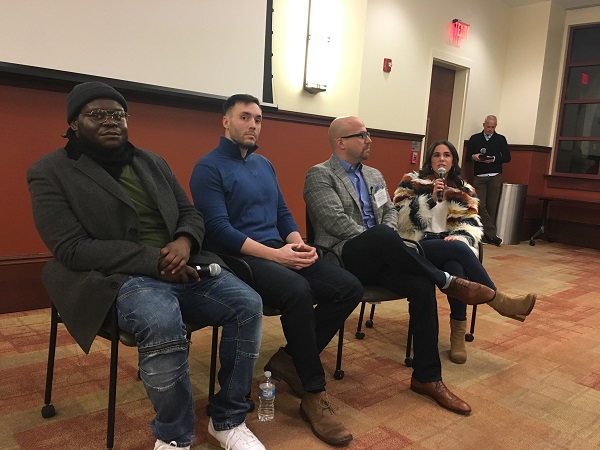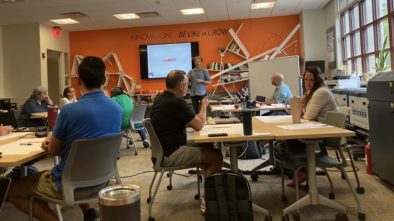Entrepreneurial Lessons Shared at Montclair Tech Meetup: Anthony Frasier and Mike Luzio
Four dynamic speakers came to the Montclair Entrepreneurs meetup on March 4 to share their entrepreneurial stories with the students and community members assembled there. Each entrepreneur was introduced by Sharon Waters, interim director and program manager at Montclair State University’s Feliciano Center for Entrepreneurship, and gave a timed presentation.
This article covers two of the speakers: Anthony Frasier and Mike Luzio. We covered the other two ― Clark Lagemann and Lauren Farrell ― in the first part of this two-part story.

Anthony Frasier Talks about the Best Thing That Ever Happened to Him … and the Worst
Anthony Frasier, the CEO of ABF Creative (Newark), which creates branded podcasts for corporations, said he that he had been a super-shy kid who’d go directly home from school and play video games. He stayed in the house a lot, but when he went online, he would talk to gamers from around the world. “Right now, that’s the cool thing to do when you look at Twitch. But back then, you were a nerd.”
He and a few of these online friends would post about the video games they were playing on a website, and they figured out that they were the top traffic source for that website. “We all had one thing in common,” he said, “we were all black.” In the video game industry, it wasn’t common to find black people talking about video games, he noted. As a result of these activities, Frasier cofounded “The Koalition” (thekoalition.com), where the friends posted reviews from the African-American point of view.
Developers started flying them out to conferences, and they got a lot of perks, but there was one thing missing, and that was money, he said. The ads didn’t pay the bills, so Frasier got a job at K-Mart. But he did leverage enough traction from the website to get an internship at a startup where he learned how to talk to developers, how to become a real CEO of a company and the wrong and right things to do.
A year and a half later, the startup failed, and “I learned that 80 percent of startups fail. That was something I wasn’t used to. Failure where I came from didn’t mean you could start up something again so fast.” Frasier had a backup plan, though. The startup’s Russian investor — a big guy that you could meet with only if you agreed to drink with him — gave him a chance, and invested $100,000 in Frasier’s new startup, called “Playd,” which was a loyalty system for video games.
“That was the best thing that ever happened to me, and the worst thing that ever happened to me,” he said, explaining that he was young and didn’t understand the investor relationship. Frasier learned that his investor had acquired a large chunk of the company without his knowing it. “I didn’t really discover this until I had Silicon Valley lawyers help me.” He told the students in the audience to look out for the “paper gangsters,” and to make sure to have their agreements vetted by lawyers.

Mike Luzio on Turning a Sales Career into Entrepreneurship Success
Mike Luzio, cofounder and managing director of The LVE Group (Holmdel), took some advice from a mentor who told him to go into sales. When he was making some money doing it, he thought it was the right field for him.
He started out by selling copiers, but “I wanted to get into the dot-com race and move back to New Jersey,” Luzio explained. He then “worked for a dot-com and had a very successful three-year run, working for a company that had absolutely no idea what they were doing, but they were growing. I learned a ton on how not to run a business.”
When the dot-com bubble burst, Luzio realized that he needed to work for a large corporation, and joined Sprint, where he was involved in selling telecom to other large corporations.
He was doing well at Sprint, and was told, “One day in 40 years you can be the CEO of Sprint.” He thought there was no way he’d be staying there for 40 years. Then “someone came to me with an idea when I was 27 years old … and he said, ‘I think we can do this. I think we can go out and start our own company,’” he told the audience.
“I had never thought of becoming an entrepreneur. Nowadays, being an entrepreneur is really cool … Twenty-five years ago, it meant you were sleeping in your parent’s basement and doing nothing.” Luzio said that he wasn’t ready to be an entrepreneur when he was younger. He needed to get some experience and seasoning first.
He decided to leave Sprint, thinking that if the startup didn’t work out, he could always go back to Sprint and still have a job there. That was important to him, as he was a family man with three kids to support. He said that he took $15,000 and with a business partner built an IT services company. “It was epic, it was awesome,” he said. “And guess what?” he asked the audience. “I can barely turn on my iPhone, but I can really sell that thing.”
Luzio and his partner bootstrapped the business from 2004 to 2008, and when the stock market crashed, “it was miserable,” he recalled. They thought they were riding high, until they weren’t. His CFO told them that they were going to be bankrupt in three months. “You have to look yourself in the eye at that point,” and figure out how to go on.
He went to his executive team and told them that they had to accept salary cuts or leave, as the company needed to raise capital on its own. “We didn’t take a salary for a year. From that point on, the company skyrocketed.”
Luzio sold the business for just under $60 million in 2013. He said that it was a humbling experience for a guy from a middle-class background whose father was in law enforcement and whose mother was a teacher.




